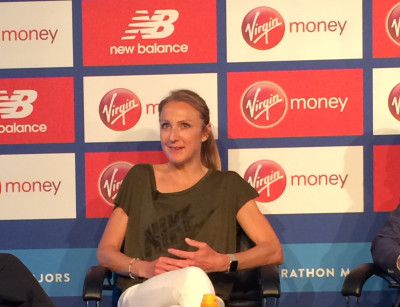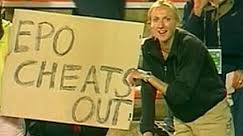15 Years On, Paula Radcliffe Reflects on Her 2:15:25 Marathon World Record
By Jonathan Gault
April 21, 2018
LONDON — In track & field, world records are only unbreakable until they’re not.
For years, Michael Johnson‘s 19.32 in 200 meters and 43.18 in the 400 meters looked unassailable. Then along came Usain Bolt and Wayde van Niekerk. Wang Junxia‘s 29:31.78 in the 10,000 meters, a record almost certainly achieved with the aid of performance-enhancing drugs, looked set to last forever until Almaz Ayana blew it out of the water with her 29:17.45 at the 2016 Olympics.
In the Olympic distance events (1500, 5k, 10k, steeple, marathon), no current record has been on the books longer than Paula Radcliffe‘s 2:15:25 in the marathon, set 15 years ago in London Marathon. For over a decade, the record looked unassailable, but there’s a chance it could be gone tomorrow. Literally. When Mary Keitany and Tirunesh Dibaba launch their world record assault at the 2018 Virgin Money London Marathon, it will represent just the second time — after Keitany’s run in London last year — that anyone has made a serious attempt on the fabled mark.
But with 96 seconds to make up — the difference between Keitany’s 2:17:01 pb and Radcliffe’s record — and warm temperatures projected to reach the high 60s Fahrenheit by race’s end, it’s still unlikely that Radcliffe’s record falls tomorrow. And Radcliffe would be quite all right with that.
“The longer it’s gone on, obviously, the more attached I’ve become to it,” Radcliffe said, who added that she would not trade her record for Olympic gold, which eluded her in her career. “And it’s started feel a little bit like part of the family. But it’s inevitable it’s going to get beaten at some point. And I think last year, the way that Mary ran, I thought for a lot of that race that it was under threat. So I think she’s capable. I think first and foremost, though, she has to concentrate on winning the race because very much she has a race on her hands with Tirunesh Dibaba.”
***
Radcliffe had an inkling that she’d be good at the marathon long before she actually attempted the 26.2-mile distance. In the months leading up to the 1992 World Cross Country Championships in Boston (where Radcliffe would win the junior race), she began working with physiologist Andy Jones, who measured her VO2 max at around 70 ml/kg/min, an unheard-of value for a 17-year-old. Or indeed, almost any runner. Ultimately, Jones told her, she would end up in the marathon.
But before turning to the roads, Radcliffe wanted to reach her potential in the shorter events, with a World Cross Country title one of her main desires. After silver medals in 1997 and 1998, and a bronze in 1999, Radcliffe finally earned World XC gold in 2001, after which she gave herself permission to explore the longer events. She chose London for her marathon debut in April 2002 and exceeded all expectations, winning in 2:18:56, just nine seconds off Catherine Ndereba‘s world record.
“You can be told you’re going to be good at the marathon, but until you run it, you don’t really experience it, and you don’t really know,” said Radcliffe, now 44. “And you find it out in the first one. I just found out that I loved it from beginning to end.”
After running a massive negative split in London (71:05-67:51), Radcliffe knew the world record was hers for the taking, and it fell in Chicago that fall, as she ran 2:17:18 with an assist from LetsRun.com co-founder Weldon Johnson. Radcliffe returned to London in 2003 with an even better buildup than prior to Chicago and knew that she was capable of lowering her mark.
“Chicago wasn’t ideal conditions by any means, so already in better conditions, I knew I could run better,” Radcliffe said.
She also had the boost of running in London. Growing up, Radcliffe would make sure to finish her run early in order watch the London Marathon on TV every year, dreaming that one day she’d be able to run the race herself. When her father, Peter, ran the race, in 1985, she got to witness the race first-hand.
“My abiding memory of growing up was actually being on the streets of London, watching,” Radcliffe said. “First Ingrid Kristiansen set a world record and then watching my dad.”
Indeed, when Radcliffe won her first of three London titles in 2002, she made her move at seven miles, claiming she was spurred on by the raucous cheering section at the famous Cutty Sark ship.
While it’s fair to question how much competing on home soil actually benefits an athlete, Radcliffe believes it was a genuine advantage.
“Running on the streets of London, I talked after [Chicago] to Haile Gebrselassie, to Paul Tergat, and they said you need to go to Berlin, you’ll run quicker, you’ll run way quicker in Berlin. I said, no, for me, London is the fastest course because of the support and because of the history that it personally had for me. I think there wasn’t a more inspirational course that I could run on.”
With ideal temperatures on race day (mid-to-low 50s), the stage was set for a special performance. Based on her training, Radcliffe knew that she was in sub-2:16 shape, but she only entered the race with one number in mind: 5:14.
“The only plan when I went in was to hit as many mile splits as possible under the average mile split of Chicago,” Radcliffe said.
Radcliffe did that for each of the first five miles, including a 4:57 on the downhill third mile. In fact, of her 26 mile splits, 22 of them were faster than her average pace in Chicago. Radcliffe’s slowest mile that day — 5:22 for mile 6 — is still 2:20:42 marathon pace. The result was an unthinkable time of 2:15:25.
Initially, Radcliffe did not think that the record would hold up as long as it has.
“I never thought that it would stand for 15 years,” Radcliffe said. “I can remember when I crossed the line, I can remember seeing [race director] Dave Bedford at the line, and he was saying oh, we’re not going to see that [record broken] for a while. I thought I could beat that, I could still improve on it.”
But as we stand in 2018, no one else in history — not even Radcliffe herself — has even broken 2:17 before or since. Radcliffe said that she was in as good, if not better, shape in the summer of 2004, but did not get the chance to prove it after a leg injury led to her dropping out of the 2004 Olympic marathon in Athens.
As Radcliffe transitioned out of the sport, officially ending her career at the 2015 London Marathon, her time only grew more firmly entrenched in the record books. In 2009 and 2010, no woman ran faster than 2:22. From 2013-2016, only five women, total, ran under 2:20; none broke 2:19. 2:15:25 looked like a helium balloon, floating off into outer space.
Then Keitany ran 2:17:01 last year after going out in 66:54, and even though she finished over 90 seconds outside of Radcliffe’s time, the fact that someone had gone out so hard and even come that close set off a debate about whether Keitany can challenge the mark on Sunday.
Because 2:15:25 has been so far out of reach for so long, there have been those who have questioned how it was possible for Radcliffe to run so fast without the aid of performance-enhancing drugs while other athletes — even those who have been caught using PEDs, such as Rita Jeptoo, Jemima Sumgong, Liliya Shobukhova — could not even approach 2:15:25. Does the fact that Keitany and Dibaba have a chance to break the record on Sunday make Radcliffe feel vindicated in any way?
“No, because I didn’t feel guilty in the first place,” said Radcliffe. “Because I know I worked very, very hard for that and I ran it clean and I’m proud of that…It’s like Catch-22. People say, if they beat your time then that will mean that you’re vindicated, but I was never guilty of anything in the first place.”
[Editor’s note: While Radcliffe was known as an outspoken anti-doping advocate during her career — she famously held up “EPO Cheats Out” sign at Worlds in 2001 and asked for her samples to be frozen and re-tested in years to come in 2002 — and currently serves as a consultant for the Athletics Integrity Unit, in 2015 a member of British Parliament implied she was potentially “under suspicion for very high levels of blood doping” after it was revealed that one of the off-scores from her blood tests was above the IAAF limit of 111.7.
Radcliffe issued a 1,716-word denial in which she stated in part, “Only one of my blood test scores is marginally above the 1 in 100 accepted threshold and this is invalid given that it was collected immediately following a half-marathon race run around midday in temperatures of approximately 30C. None of my blood test scores are anywhere near the 1 in 1,000 threshold as was claimed by the Sunday Times and that which is seen as suspicion of doping. No abnormalities were ultimately found and any allegation that the IAAF did not follow up on blood data results in my case is false.”
The IAAF went a step further and issued a 38-page report in regards to the Radcliffe tests and others. Nearly 2,000 words of that report were devoted directly to the Radcliffe case. The IAAF wrote in part, “The circumstances in which Ms Radcliffe came to be publicly accused are truly shocking. …..This case is a good example, then, of how dangerous it is to insinuate that an athlete has doped based simply on the raw and incomplete data in the leaked database. Ms Radcliffe should never have been forced to come out and defend herself against such insinuations….The data therefore provide no basis whatsoever for the insinuations made against her.”
MB: Radcliffe blood values released]
***
These days, Radcliffe still runs frequently, but only for pleasure, or occasionally therapeutic purposes.
“I don’t even start my watch most days and I run how I feel,” Radcliffe. “I’ve never come back from a run and felt worse than before I went. That’s more what I use it for now than trying to be fit.”
Her record could be broken on Sunday, but considering the warm weather in the forecast and the difficulty of actually running 2:15:25, it is just as likely that her mark stands for another 10 years. And when (if?) it does go down, the digits 2:15:25 will still remain special to Radcliffe. It is, after all, her personal best, and while only a few people are able to experience the feeling of setting a world record, any serious runner knows the feeling of satisfaction that accompanies a hard-earned PB.
“I just wanted to be able to finish my career and say, Yeah, I achieved what I was capable of: that was the best I was capable of doing. And I think on that day in 2003, everything came together and it came very, very close to being the best that I was capable of doing.”





